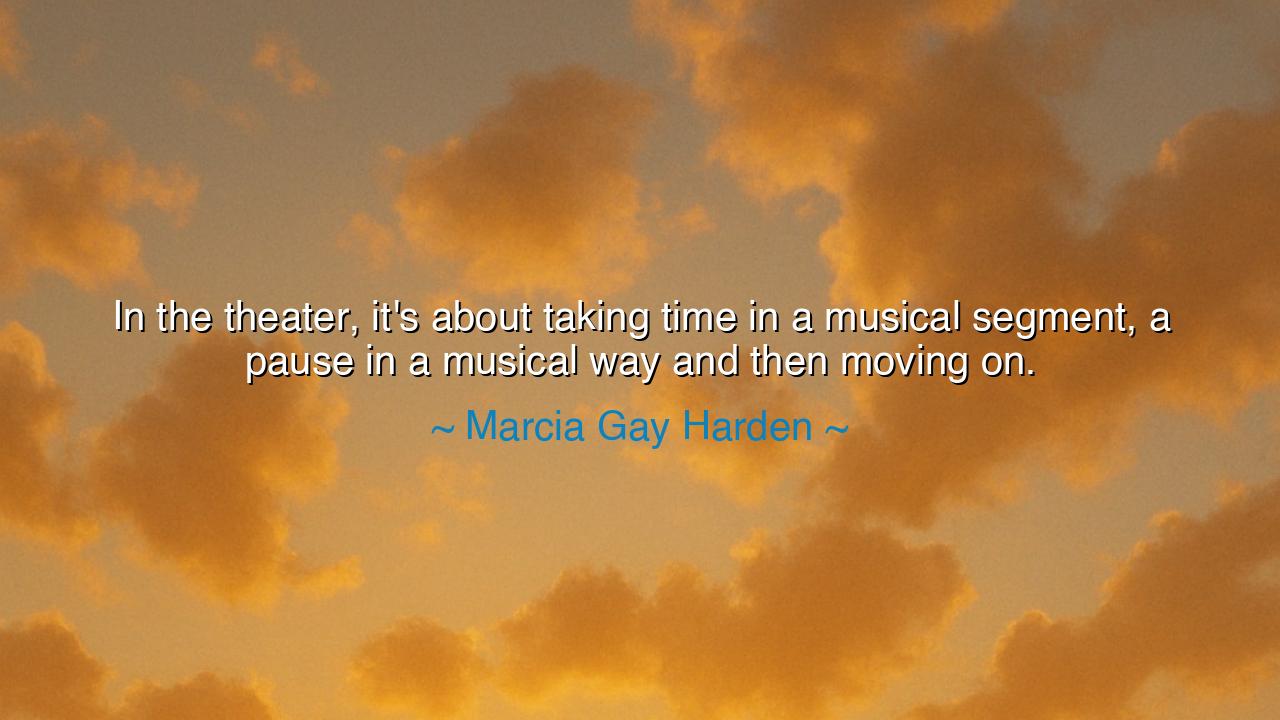
In the theater, it's about taking time in a musical segment, a
In the theater, it's about taking time in a musical segment, a pause in a musical way and then moving on.






Hear the words of Marcia Gay Harden, whose craft has been honed upon the sacred stage: “In the theater, it's about taking time in a musical segment, a pause in a musical way and then moving on.” Though she speaks of theater, her insight touches the very rhythm of life. For existence itself is like a great performance, composed not only of action and sound, but also of silence, rest, and the measured art of the pause. Without pause, the song is noise; without stillness, the motion is chaos. The wisdom lies in knowing when to linger and when to continue.
The pause is not emptiness—it is power. In music, silence heightens sound; in speech, stillness sharpens words; in life, rest strengthens action. The pause is the sacred space where meaning gathers, where breath is drawn before the next line is spoken. Harden’s words remind us that the stage teaches life itself: to act with rhythm, to feel the moment, to allow silence to deepen truth before pressing onward. The pause is not retreat, but preparation.
The ancients knew this well. The Greeks, who gave us the theater itself, understood that tragedy and comedy alike depended not only upon speech and gesture but upon the pregnant silence between. The chorus would chant, then fall still, and in that stillness the audience felt the weight of fate. Likewise, the Romans in their oratory would pause deliberately, letting the crowd lean forward in anticipation. These pauses gave their words the power of thunder following lightning.
Consider the tale of Martin Luther King Jr. in his “I Have a Dream” speech. His words soared, but his pauses carried equal force. Each silence invited the crowd to breathe, to reflect, to feel the gravity of his vision. Had he rushed onward without rest, the speech would have been less than it became. The power of his message lay in the balance of words and pauses, in the music of timing, not in words alone.
So too in life itself: we often strive to fill every space with noise, every moment with action, fearing silence as though it were death. Yet true wisdom is to embrace the pause. In the quiet between labors, strength returns. In the silence between words, love and meaning are understood. In the stillness between storms, clarity is found. Just as the actor cannot rush the stage, the soul cannot rush its journey.
What lesson, then, must you take? Do not be afraid to pause in your own life. After victory, pause in gratitude before rushing into the next challenge. After failure, pause in reflection before attempting again. In conversations, pause to listen instead of rushing to reply. In work, pause to breathe, so that what you create carries depth rather than haste. The pause is not wasted time; it is fertile ground from which the next act emerges stronger.
Practical actions are these: learn to punctuate your days with silence. Begin the morning not with frenzy, but with a moment of quiet breath. End the evening not with noise, but with reflection. In the midst of conflict, pause before you answer; in the midst of labor, pause before you break. Like an actor who feels the pulse of the scene, feel the pulse of your own life. Then move on—not in haste, but in rhythm.
Thus remember Harden’s wisdom: life is theater, and theater is rhythm. The song is made by its pauses as much as its notes, the speech by its silences as much as its words. Take your pauses with courage, let them deepen your story, and then move on with strength. In this way, your life will not be rushed chaos, but a symphony of meaning, balanced and whole.






AAdministratorAdministrator
Welcome, honored guests. Please leave a comment, we will respond soon